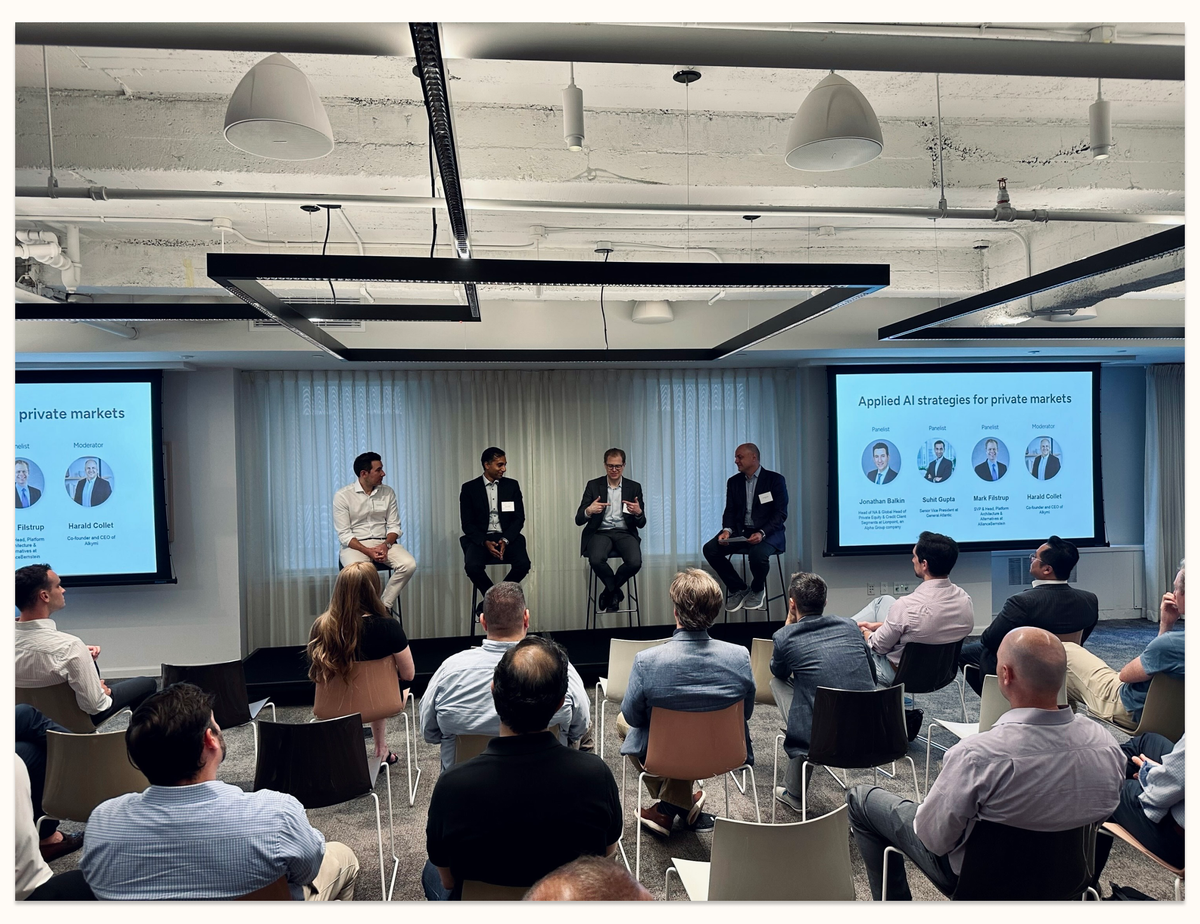
Company Updates July 18, 2024
Applied AI strategies for private markets: takeaways from our NYC Happy Hour

We were thrilled to recently bring together top investment operations executives for an evening of insightful discussion, networking, and hors d'oeuvres in New York City. During the opening panel, we heard insights from Mark Filstrup of AllianceBernstein, Suhit Gupta of General Atlantic, and Jonathan Balkin of Lionpoint Group, who shared strategies for utilizing AI in private markets firms. The discussion ranged from use cases for AI in both operations teams and the front office to practical challenges with implementation and data security.
Here are some of our key takeaways and highlights from the panel:

Where do you see AI having the biggest potential impact for private markets?
Operational efficiency: In such a historically manual and document-heavy industry, our panelists agree there is a significant opportunity to automate workflows throughout the investment lifecycle, in both the back and front office. AI and ML can automate document processing and extract data from critical documents, and generative AI presents a new opportunity for helping with tasks like memo creation.
Revenue generation: Investment teams managing deal sourcing want to be able to quickly churn through datasets and documents for due diligence on incoming opportunities. If they can use AI to find the key information they need in large documents or corporate filings faster and summarize it instantly, they can get to a valuation and decision more quickly and make a more competitive offer. With existing processes, firms can only review so many deals a year. AI empowers them to evaluate data more quickly; for example, if a firm can increase the number of deals they review from 8 deals a year to 28 deals a year, that would have a huge effect.
What types of workflows are firms considering, or already implementing, AI into?
Automated investment document processing: AI allows firms to extract key data from unstructured documents and validate it. One example shared was a PCAP, or Partners’ Capital Account Statement—a firm could receive thousands of PCAP PDFs per quarter. AI enables them to process every aspect of the statements and extract the key info, even as the format varies across GPs. Our CEO, Harald Collet, who was hosting the panel, noted that one Alkymi client has processed over a million statements with Alkymi.
Client onboarding: Firms need to gather data across multiple different documents. Some outsource manual data extraction to external teams, but that process typically entails a longer turnaround to receive the validated data and the need to review data to confirm its accuracy. AI allows them to do it faster and in-house.
Reporting: More detailed and faster reporting improves the client experience, and AI can help them increase speed and access deeper levels of data.
Thinking about an AI strategy, should firms approach it as a large initiative with a committee, or on a smaller scale, on an individual project basis?
Many firms are doing both—they’re implementing new individual team AI projects, but they’re also implementing AI policies at the firm level as well. Some large firms, like AllianceBernstein, have appointed a Chief AI Officer and data science teams to develop the firm’s own models.
What are you hoping to see with AI long term?
There are many industry-agnostic AI software options available, but it takes significant work to train generic models on your specific use case. The panelists agree they see the most value in industry-specialized technology, pre-trained for private equity, private investments, and real estate data. Greater availability of private markets-specific technology will enable any company or firm to lean into AI without a team of data scientists on staff, making AI more accessible to all firms.
We’re looking forward to keeping the conversation going at our next event.
More from the blog
Introducing Alkymi Private Credit
by Harald ColletAlkymi Launches Alkymi Private Credit, AI-Powered Private Credit Solution to Automate Complex Loan Data Workflows
Alkymi Supports Groq and GroqCloud for Secure, Scalable AI in Private Markets
by Steven SheAlkymi pairs Groq’s high-performance AI infrastructure with governed private-markets data to enable secure, enterprise-grade AI.
2025: A Pivotal Year for AI and Private Markets
by Maria OrlovaA 2025 review of Alkymi’s work helping private markets institutions replace manual data workflows with trusted, AI-ready infrastructure.





